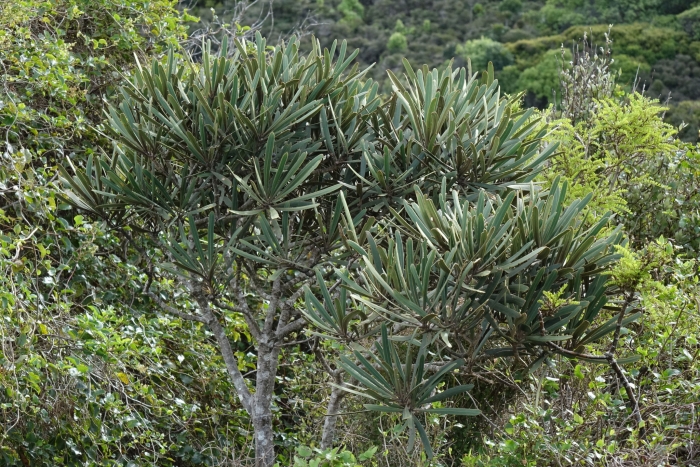Toothed Lancewood
(Pseudopanax ferox)
Toothed Lancewood (Pseudopanax ferox)
/
/

John Barkla
CC BY 4.0
Image By:
John Barkla
Recorded By:
Copyright:
CC BY 4.0
Copyright Notice:
Photo by: John Barkla | License Type: CC BY 4.0 | License URL: http://creativecommons.org/licenses/by/4.0/ | Rights Holder: John Barkla | Publisher: iNaturalist | Date Created: 2016-04-16T14:18:16-07:00 |





















































Estimated Native Range
Summary
Pseudopanax ferox, commonly known as Toothed Lancewood, is an evergreen tree native to the temperate rainforests of New Zealand. It typically grows to a height and width of 10-15 feet (3-4.5 meters), making it a relatively small tree. The juvenile form of this tree is particularly striking, with long, narrow, downward-hanging leaves that have tooth-like serrations on the edges, giving the plant its common name. As the tree matures, the leaves become shorter, wider, and lose their serrations. The Toothed Lancewood produces inconspicuous green flowers in the summer, followed by small, purple-black berries that are attractive to birds.
Toothed Lancewood is valued for its unique juvenile foliage, which adds an architectural element to gardens and landscapes. It is suitable for small gardens due to its slow growth rate and compact size. The plant is also used as a specimen or accent in urban settings and can be planted in groups to create a dramatic effect. It thrives in full sun to part shade and prefers well-drained soils. While it is drought-tolerant once established, it benefits from occasional watering during prolonged dry periods. It is generally hardy but can suffer minor frost damage to the tips, which may cause branching. It is also tolerant of dry locations and high winds, making it a versatile choice for challenging sites.CC BY-SA 4.0
Toothed Lancewood is valued for its unique juvenile foliage, which adds an architectural element to gardens and landscapes. It is suitable for small gardens due to its slow growth rate and compact size. The plant is also used as a specimen or accent in urban settings and can be planted in groups to create a dramatic effect. It thrives in full sun to part shade and prefers well-drained soils. While it is drought-tolerant once established, it benefits from occasional watering during prolonged dry periods. It is generally hardy but can suffer minor frost damage to the tips, which may cause branching. It is also tolerant of dry locations and high winds, making it a versatile choice for challenging sites.CC BY-SA 4.0
Plant Description
- Plant Type: Tree
- Height: 10-15 feet
- Width: 10-15 feet
- Growth Rate: Slow
- Flower Color: Green
- Flowering Season: Summer
- Leaf Retention: Evergreen
Growth Requirements
- Sun: Full Sun, Part Shade
- Water: Low, Medium
- Drainage: Fast
Common Uses
Low Maintenance, Potted Plant, Rock Garden
Natural Habitat
Temperate rainforests of New Zealand
Other Names
Common Names: Horoeka
Scientific Names: , Pseudopanax ferox, Panax ferox,
GBIF Accepted Name: Pseudopanax ferox Kirk